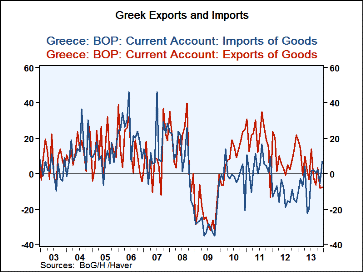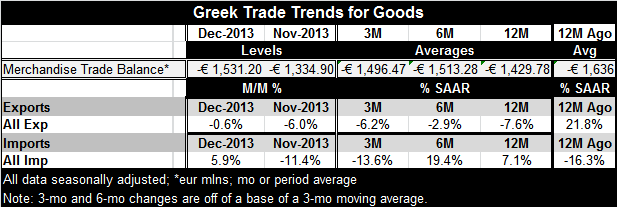 Global| Feb 19 2014
Global| Feb 19 2014Greek Trade Trends Still Hit Sour Notes
Summary
The Greek merchandise trade deficit slipped deeper into red-ink territory in December, falling to 1.5 billion euro from a 1.3 billion euro deficit in November. At this point it's not clear what we would consider as truly good news for [...]
 The Greek merchandise trade deficit slipped deeper into red-ink territory in December, falling to 1.5 billion euro from a 1.3 billion euro deficit in November.
The Greek merchandise trade deficit slipped deeper into red-ink territory in December, falling to 1.5 billion euro from a 1.3 billion euro deficit in November.
At this point it's not clear what we would consider as truly good news for Greece. A bigger deficit might be desirable for a short time if that reflected some revival in domestic demand. A smaller deficit would be desirable if improvement was caused by strong exports. Instead, after a number of months and years of laboring under austerity, Greece continues to defy any expectations of real improvement.
Exports remain weak. They fell by 0.6% in December. Exports are down at a 6.2% annual rate over three months, down at a 2.9% annual rate over six months, and down at a 7.6% annual rate over 12 months. Do you see a pattern there? There is no clear improving pattern in the sequence of growth rates. Greece does not seem to have improved its competitiveness on the export side at all. Export trends still show a great deal of weakness and floundering.
The import side shows a bit more promise. Still, the trends are not dependable. Over three months imports are falling at a 13.6% annual rate; however, they are still up at a 19.4% annual rate over six months and up 7.1% over the last 12 months. This might suggest that there has been some firming in domestic demand despite the recent weakness in imports. The fact is that imports are up by 7% over the last year. In December imports rose by 5.9%; while that may seem hopeful, we did see imports falling by 11.4% in November.
The chart shows the extreme volatility in both export and import trends. The chart is based on year-over-year export and import growth; in a big picture sense what it seems to be showing is that exports are still floundering and moving to lower rates growth while imports are struggling to show persistent year-over-year gains. That would suggest that competitiveness in Greece has not been restored because export trends are still deteriorating. But it also suggests that there is some revival in domestic demand since imports have been working their way higher.
Having some revival in import trends is a a good sign for Greece. However, at the same time Greek competitiveness has to improve so that exports can pay the way for imports; a rising trade deficit is not really good news for Greece. The country is still not putting together the combination of demand and competitiveness that its economy is going to need for sustaining recovery. Greece continues to struggle and the chemotherapy of austerity appears to leave it in a state too week to mount any real recovery.

Robert Brusca
AuthorMore in Author Profile »Robert A. Brusca is Chief Economist of Fact and Opinion Economics, a consulting firm he founded in Manhattan. He has been an economist on Wall Street for over 25 years. He has visited central banking and large institutional clients in over 30 countries in his career as an economist. Mr. Brusca was a Divisional Research Chief at the Federal Reserve Bank of NY (Chief of the International Financial markets Division), a Fed Watcher at Irving Trust and Chief Economist at Nikko Securities International. He is widely quoted and appears in various media. Mr. Brusca holds an MA and Ph.D. in economics from Michigan State University and a BA in Economics from the University of Michigan. His research pursues his strong interests in non aligned policy economics as well as international economics. FAO Economics’ research targets investors to assist them in making better investment decisions in stocks, bonds and in a variety of international assets. The company does not manage money and has no conflicts in giving economic advice.






